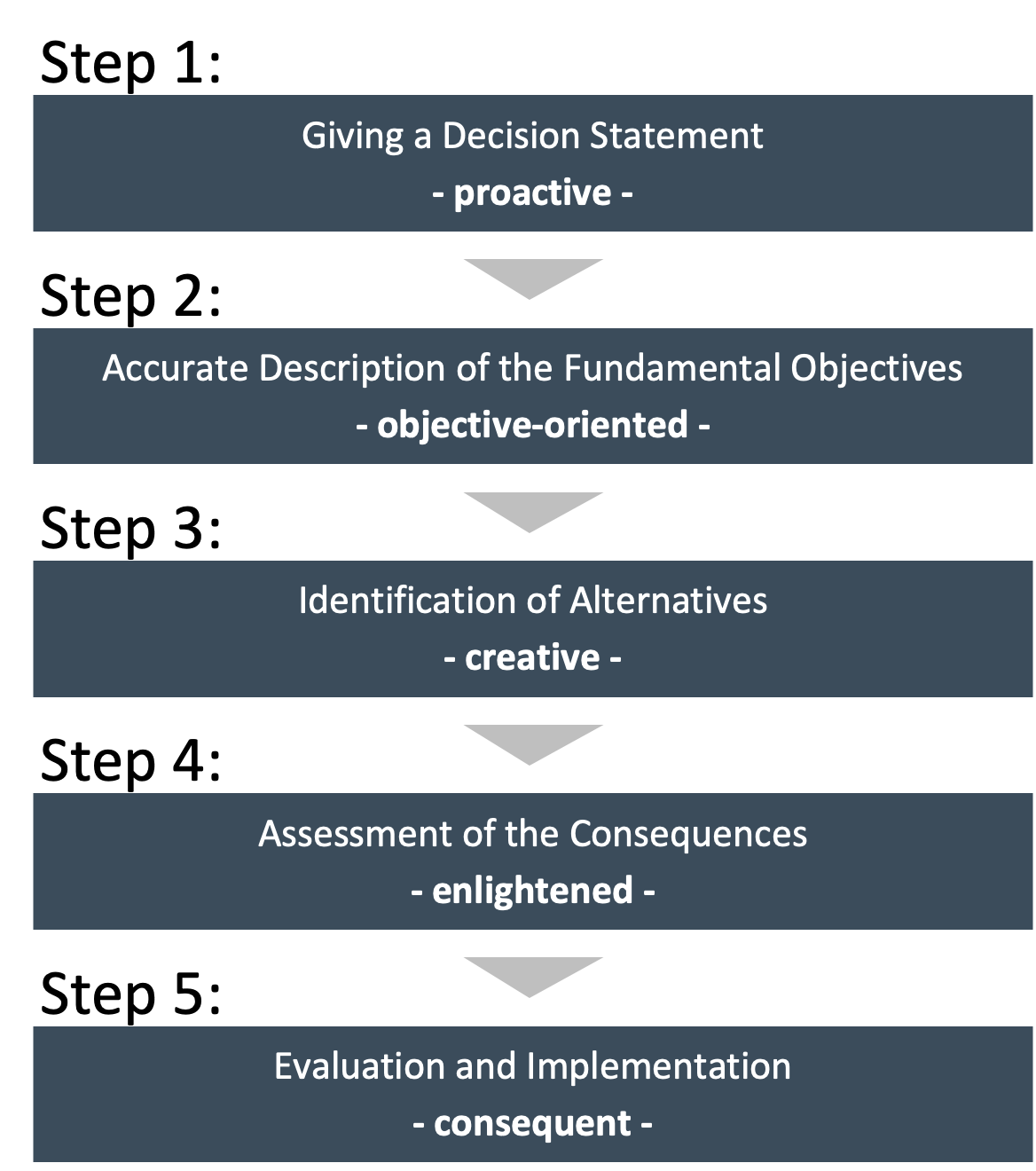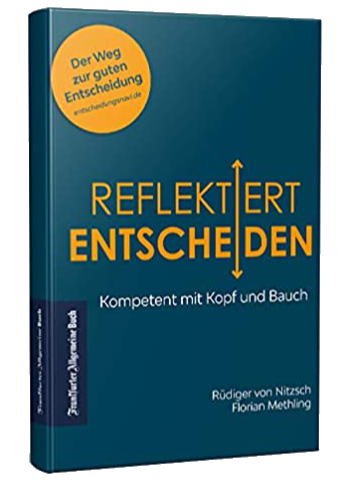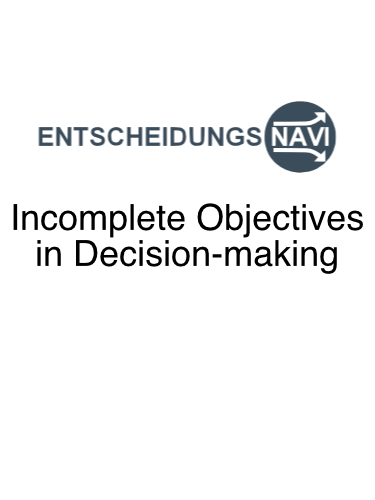The Entscheidungsnavi offers guidelines for a decision-making process based on all the essential findings from modern decision-making research on how to achieve a high-quality decision. The focus here is on the value-focused thinking approach of Prof. Ralph Keeney. This approach is characterized by a proactive approach to decisions (step 1), a very reflective analysis of values and objectives (step 2) and a creative search for alternatives (step 3). The key research findings of the Nobel Prize laureate Prof. Daniel Kahneman are also considered in the Entscheidungsnavi. The tool contains many hints and tips on how to avoid the psychological pitfalls and distortions known from descriptive decision research in the impact prognoses (step 4). Added to all of this is the fifth step of the Entscheidungsnavi, a comparison of the analytical- and intuitive assessment to bring your head and gut feeling together. The result is a five-step decision-making process that we call “Reflective Decision-making”.
Fields of application of reflective decision-making
A reflective decision-making process, as implemented in the Entscheidungsnavi, can be valuable in all decisions. This includes all important personal- and professional decisions. Companies or consulting firms benefit from this approach if they value transparency and participation in addition to high-quality decisions. All group decisions, both small and large, can benefit from such a structured approach because it increases both the efficiency and the quality of the result. Finally, the process can also be applied to any form of opinion-forming in all social or political issues.
The book
This book (only available in German) is suitable for anyone who would like to learn more about the concept of “Reflective Decision-making”. It gives you food for thought and explains the methods that can be used to improve your decision-making behavior. These methods are also used in the Entscheidungsnavi. The content is illustrated with an example of the employed engineer Alex, who is no longer satisfied with his career and is looking for better life plans. It also contains valuable information on how a moderator can lead group decisions in a more targeted manner and how to get a grip on conflicts.
von Nitzsch, Rüdiger & Methling, Florian (2021) „Reflektiert Entscheiden: Kompetent mit Kopf und Bauch“, Frankfurter Allgemeine Buch. | ISBN: 396251094X

Peters, Sven; Tönsfeuerborn, Mendy; von Nitzsch, Rüdiger (2024) “Integrating Uncertainties in a Multi-Criteria Decision Analysis with the ENTSCHEIDUNGSNAVI” in Mathematics 2024, 12(11), 1746.
In this article, the authors describe the possibilities of the Entscheidungsnavi to model and analyze decisions under uncertainty with their corresponding calculations. View
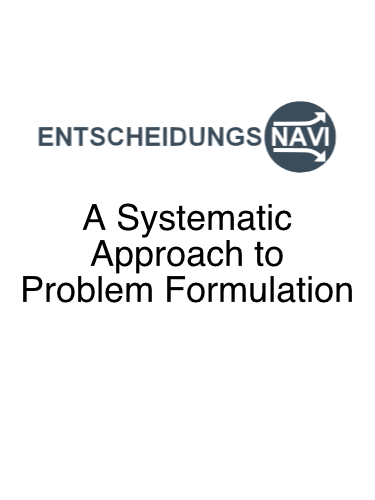
Hannes, Christian; von Nitzsch, Rüdiger (2024) „A systematic approach to problem formulation in a decision support system“ in International Journal of Decision Support Systems, Vol 5, Issue 1.
In this article, the authors analyse how the Entscheidungsnavi supports the formulation of decision statements based on 850 student projects.
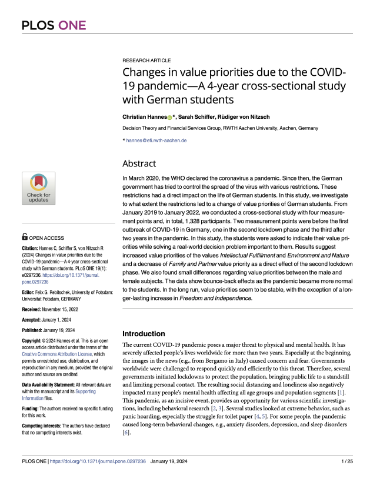
Hannes, Christian; Schiffer, Sarah; von Nitzsch, Rüdiger (2024) „ Changes in value priorities due to the COVID-19 pandemic—A 4-year cross-sectional study with German students “ in PLOS ONE, 19(1).
In this article, the authors analyse the impact of government measures and restrictions during the pandemic on students’ values.
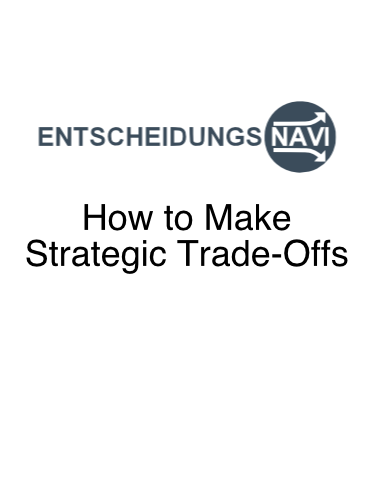
Seidler, Mark; Methling, Florian; von Nitzsch, Rüdiger (2022) “How to Make Strategic Trade-Offs” in: Harvard Business Review.
This paper uses practical examples in a corporate context to illustrate how the objective weighting used in the decision navigator can also be used in a valuable way in strategic management and corporate governance with the help of tradeoffs. View

Hannes, Christian; von Nitzsch, Rüdiger (2022) “A systematic approach to problem formulation in a decision support system” in: Int. J. of Decision Support Systems, Special Issue: Euro 21 Intelligent Decision Support Methods.
In this paper, Rüdiger von Nitzsch and Christian Hannes examined how the systematic support of the Entscheidungsnavi helps to formulate the appropriate decision statement and thus to gain a better understanding of the personal decision.
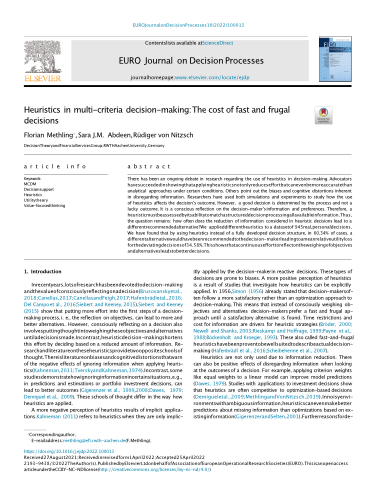
Methling, Florian; Abdeen, Sara J.M.; von Nitzsch, Rüdiger (2022) “Heuristics in multi-criteria decision-making: The cost of fast and frugal decisions” in: EURO Journal on Decision Processes Vol. 10.
In this paper, the researchers used both simulations and experiments to investigate how the use of heuristics affects the outcome of the decision. Download
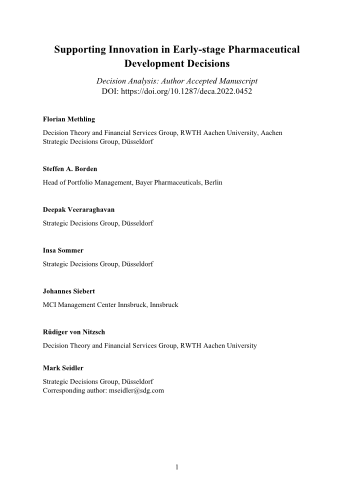
Methling, Florian; Borden, Steffen A.; Veeraraghavan, Deepak; Sommer, Insa; Siebert, Johannes; von Nitzsch, Rüdiger; Seidler, Mark (2022) “Supporting Innovation in Early-Stage Pharmaceutical Development Decisions” in: Decision Analysis.
This study proposes a more holistic methodology to support early-stage pharmaceutical development decisions using value-focused thinking and multi-criteria decision-making. Download
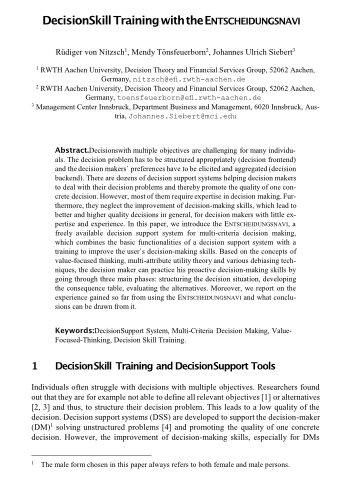
von Nitzsch, Rüdiger; Tönsfeuerborn, Mendy & Siebert, Johannes (2020) „Decision Skill Training with the ENTSCHEIDUNGSNAVI“, in: Innovation for Systems Information and Decision: Second International Meeting, INSID 2020, Recife, Brazil, December 2–4, 2020, Proceedings / edited by Adiel Teixeira de Almeida, Danielle Costa Morais, 15-30.
This conference paper focuses on the main features of the Entscheidungsnavi from a more scientific perspective.
More Publications on the Entscheidungsnavi in German can be found on the German part of this Website.

